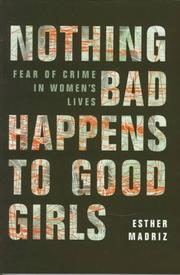| Listing 1 - 1 of 1 |
Sort by
|

ISBN: 0520918967 0585047685 9780520918962 9780585047683 0520202910 0520208552 Year: 1997 Publisher: Berkeley University of California Press
Abstract | Keywords | Export | Availability | Bookmark
 Loading...
Loading...Choose an application
- Reference Manager
- EndNote
- RefWorks (Direct export to RefWorks)
"The possibility of being a victim of a crime is ever present on my mind; thinking about it as natural as breathing."--40-year-old woman This is a compelling analysis of how women in the United States perceive the threat of crime in their everyday lives and how that perception controls their behavior. Esther Madriz draws on focus groups and in-depth interviews to show the damage that fear can wreak on women of different ages and socioeconomic backgrounds. Although anxiety about crime affects virtually every woman, Madriz shows that race and class position play a role in a woman's sense of vulnerability. Fear of crime has resulted in public demand for stronger and more repressive policies throughout the country. As funds for social programs are cut, Madriz points out, those for more prisons and police are on the increase. She also illustrates how media images of victims--"good" victims aren't culpable, "bad" victims invite trouble--and a tough political stance toward criminals are linked to a general climate of economic uncertainty and conservatism. Madriz argues that fear itself is a strong element in keeping women in subservient and self-limiting social positions. "Policing" themselves, they construct a restricted world that leads to positions of even greater subordination: Being a woman means being vulnerable. Considering the enormous attention given to crime today, including victims' rights and use of public funds, Madriz's informative study is especially timely.
Women --- Fear of crime --- Social Welfare & Social Work --- Social Sciences --- Criminology, Penology & Juvenile Delinquency --- Crime --- Crimes against --- Psychology --- Attitudes --- Psychology. --- Attitudes. --- abuse. --- anxiety. --- bad victims. --- conservative politics. --- crime. --- criminal justice. --- criminology. --- culpability. --- danger. --- fear of crime. --- fear. --- female victims. --- feminism. --- feminist theory. --- gender hierarchy. --- gender studies. --- gender. --- good victims. --- law and order. --- legal system. --- media. --- nonfiction. --- patriarchy. --- potential victim. --- poverty. --- risk management. --- social justice. --- social programs. --- social science. --- subservience. --- threat perception. --- threat. --- victims rights. --- victims. --- violence against women. --- vulnerability. --- women. --- womens issues. --- womens studies.
| Listing 1 - 1 of 1 |
Sort by
|

 Search
Search Feedback
Feedback About UniCat
About UniCat  Help
Help News
News